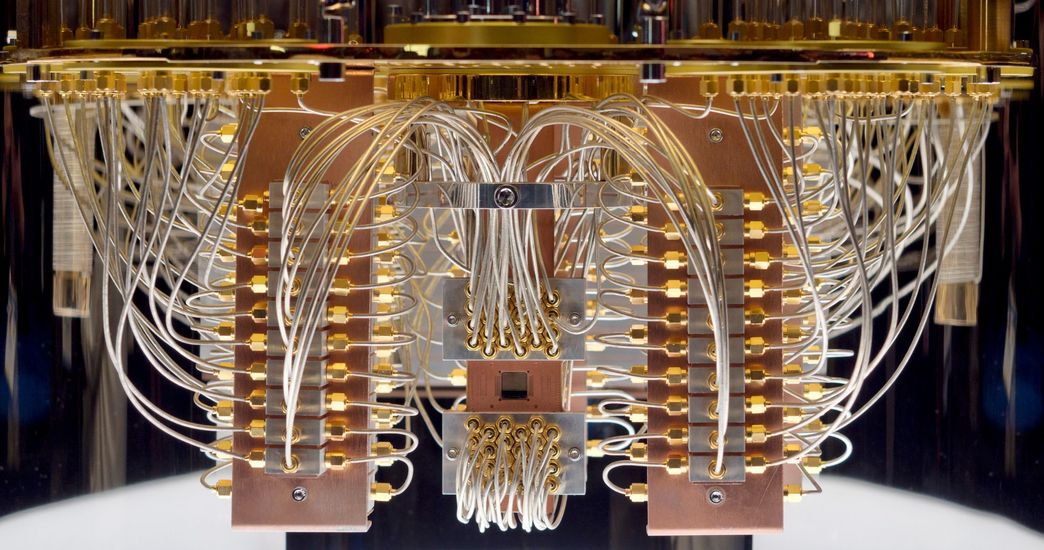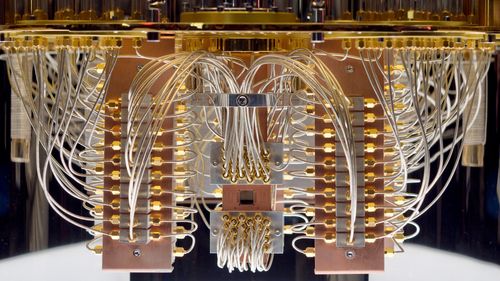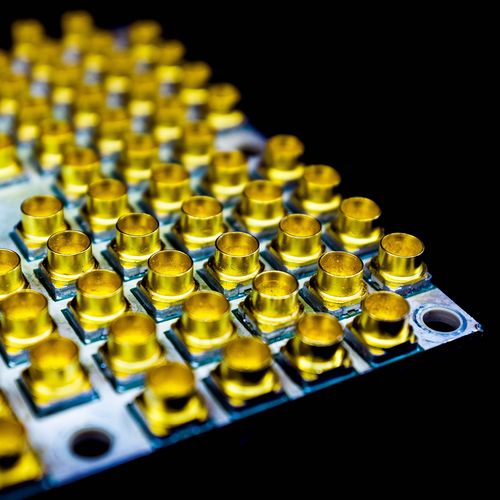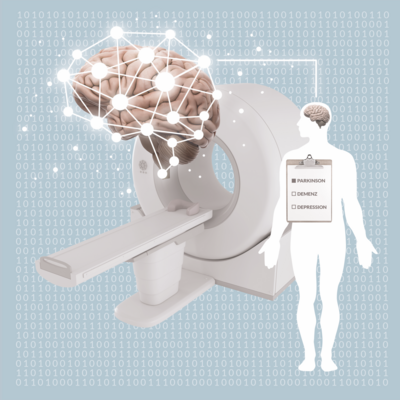Basketball Player at the Supercomputer

Quantum computers promise unimaginable computing power - theoretically. So far, they can’t be used because their results are rife with errors. Tom Weber is working at DASHH on a software that aims to compensate for this.
And now he has a dog to take care of, too. “His name is Marley, he’s a poodle - West Highland terrier cross,” says Weber, pointing to the white creature lying next to him in its dog basket. His girlfriend’s parents gave them Marley to take care of, so at least Weber gets to take long walks, even if his basketball training has been canceled for months due to the coronavirus pandemic.
Weber is easy to talk to. This first thing you notice about him is his distinctive curly hair, which makes him appear taller than he already is with his classic basketball player’s stature of over six feet. But most of all, you notice the ease with which he suddenly switches from talking about his dog or sports to the highly complex topic he’s most preoccupied with right now—quantum computers. “I had absolutely no plans to work on this topic,” he says, “but the first time I read about it, I was immediately fascinated.” The official title of his doctoral thesis is “Optimization of quantum circuits using error analysis and modeling”—but Weber quickly follows this up with an explanation that sheds a bit more light on the topic. “Right now, quantum computers have high error rates. In my project, I’m looking for methods that will make it possible to use them in the near future despite these errors.” The software Weber is developing can be imagined as a type of filter: It filters the results quantum computers produce during their calculations and removes the errors from them.
Faulty qubits
But Weber’s penchant for complex topics started before his doctorate. He grew up between the cities of Hamburg and Lüneburg in northern Germany and was still in school when he realized that he was fascinated by the questions covered in his physics classes. Doing a degree in physics was something he had never considered. During his master’s in Hamburg, he focused on mathematical aspects in the field of physics. “I had actually planned to do a doctorate in mathematics—but I applied for many, many doctoral positions, and nothing came of it.” But then he happened to come across a tender for this project at DASHH (Data Science in Hamburg – Helmholtz Graduate School for the Structure of Matter), one of six Helmholtz Information & Data Science Schools. All of the schools are part of the Helmholtz Information & Data Science Academy (HIDA), Germany’s largest post-graduate training network in the field of information and data science. The tender was for a doctoral candidate who would be working with quantum computers. “I read the outline of what it involved and liked it so much that I applied there and then.” Weber got the position and started his work when he was just 24 years old—he had skipped first grade when he was a child, which meant he was only 17 when he began his degree.
And how many times already has he explained exactly what he’s researching? “Countless times,” says Weber without thinking twice. When he explains his project, he usually starts with how a quantum computer works. While a conventional computer processes bits consisting of zeros and ones, quantum computers use quantum bits, known as qubits. Qubits can not only be zeros and ones but also any imaginable value in between. This means they can process more computing operations simultaneously—and experts believe that they will soon eclipse even today’s supercomputers, which work with conventional bits. “The only problem is that qubits still throw up a lot of mistakes,” says Weber. “If you think about it in terms of conventional computers, it would be as if it suddenly displayed a one instead of a zero.” This is the starting point for his research project, and the goal is to eliminate these errors from the results.
He has never stood before a quantum computer
It’s also important to understand that science is pinning a lot of hopes on quantum computers right now. Behind the scenes, a global competition is underway, and big companies are also involved: IBM, for instance, is conducting intensive research on quantum computers, Google is pursuing an extensive research program, and Chinese firms such as Alibaba and Baidu are also registering an ever-growing number of patents. At the heart of this competition is the question of how many qubits can already be built into a computer today—that is, how powerful the computers are. Remarkable advances are attained on a regular basis, but the problem is still the error rate.
“Science is approaching this challenge from two different angles,” Weber explains: “Some researchers focus on reducing the error rate. The main aspect for them is improving the hardware.” And then there’s the other angle—which Weber works on in his own project. “We accept that quantum computers aren’t all that reliable yet and try to make the faulty results they produce usable despite that.” So far, Weber has never stood in front of a quantum computer himself. When he uses their processing power, he does so from home or from his office—which involves sending tasks to the quantum computers (he currently uses devices at IBM in the state of New York in the US) and receiving the results a short time later.
The quantum computer runs through the same task several times. Tom Weber is developing a piece of software that runs on a conventional computer and analyzes the quantum computer’s results to check for these deviations and anomalies.
A software to check the super computers
Once again, Weber uses a tangible comparison to explain his work: “Imagine a dice,” he says. “If you roll the dice once and you get a four, that’s a snapshot. A picture only emerges when you roll the dice many times in a row and take a look at the results. You can see whether there are deviations and anomalies.” In terms of Weber’s work, this means that quantum computers run through the same task many times. And Weber is developing a piece of software that runs on a conventional computer and analyzes the quantum computer’s results to check for these deviations and anomalies. “I do this by having the quantum computer process a task for which I know the result. This lets me verify whether my program is drawing the right conclusions based on the results from the quantum computer.”
It’s a highly complex mathematical problem—and this is where Weber’s original plan of doing a doctorate in mathematics comes full circle. He still remembers well the crucial conversation before he got the position at the graduate school. “I was sitting across from a math and physics professor, a doctoral candidate from the team I work on now, and two postdocs, and they all knew that I hadn’t had anything to do with quantum computers before that.” Nonetheless, he got the position thanks to his mathematical skills—and because the chemistry was right. Which is another important aspect, because after all, Weber doesn’t do his research in isolation. He is involved in various working groups throughout the week, both at the University of Hamburg and at DESY in Zeuthen. “In all these meetings, we look at individual aspects that play a role in my work,” says Weber—“and I come away with a lot of knowledge wherever I go.”
So much knowledge that he sometimes needs to work off some steam. And just like that, the conversation is back to basketball and Marley the mutt. Weber often plays piano too when he’s done with work. “I started playing when I was seven years old,” he says. Right now, he says he’s working his way through Frédéric Chopin’s Fantaisie-Impromptu—and, unlike basketball, he hasn’t had to take a break from the piano due to coronavirus.
Author: Kilian Kirchgessner












